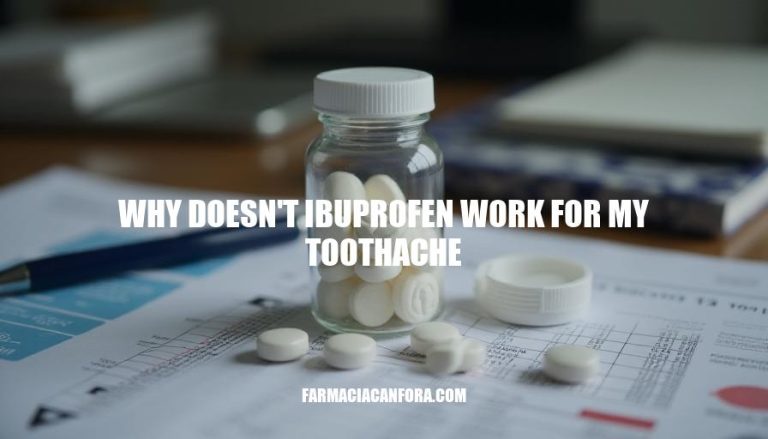


Ibuprofen is a widely used over-the-counter medication known for its effectiveness in relieving various types of pain, including headaches, muscle aches, and inflammation. People often turn to ibuprofen for toothaches because it helps reduce the inflammation and pain associated with dental issues.
Ibuprofen works by inhibiting the enzyme cyclooxygenase (COX), which is essential for the production of prostaglandins. Prostaglandins are compounds that cause inflammation, pain, and fever. By blocking COX, ibuprofen reduces the levels of prostaglandins, thereby alleviating inflammation and pain.
In terms of effectiveness, ibuprofen is widely used to relieve mild to moderate pain, reduce inflammation, and lower fever. It is effective for conditions like arthritis, menstrual cramps, headaches, and minor injuries. Its anti-inflammatory effects usually take longer to manifest, sometimes up to a week.
Toothaches can arise from several causes, each requiring specific treatments beyond just ibuprofen:
Tooth Decay: This is the most common cause of toothache. When bacteria in the mouth produce acids that erode the enamel, cavities form, exposing the sensitive inner layers of the tooth. This can lead to persistent pain that ibuprofen alone can’t resolve. Dental fillings or crowns are often necessary to repair the damage.
Infection: Infections can occur in the tooth pulp (the innermost part of the tooth containing nerves and blood vessels) due to untreated cavities or cracks. This can lead to severe pain and swelling. Antibiotics may be needed to clear the infection, and a root canal or extraction might be required to remove the infected tissue.
Abscesses: A tooth abscess is a pocket of pus caused by a bacterial infection. It can occur at the tip of the tooth root (periapical abscess) or in the gums (periodontal abscess). Abscesses cause intense, throbbing pain and can spread to other parts of the body if untreated. Treatment involves draining the abscess, antibiotics, and possibly a root canal or tooth extraction.
Gum Disease: Gingivitis and periodontitis can cause toothaches by inflaming and infecting the gums. This can lead to pain, swelling, and even tooth loss. Professional cleaning and improved oral hygiene are essential to manage gum disease.
Cracked or Broken Teeth: Physical damage to teeth can expose the inner layers, causing pain. Depending on the severity, treatments can range from bonding and crowns to root canals or extractions.
Ibuprofen can help manage pain and inflammation temporarily, but it doesn’t address the underlying issues. Professional dental treatment is crucial to resolve the root cause and prevent further complications. If you’re experiencing persistent tooth pain, it’s best to see a dentist promptly.
Ibuprofen might not be effective for toothache due to several specific reasons:
Severity of the Condition:
Presence of Infection or Abscess:
Other Factors:
These conditions often require professional dental treatment to address the underlying issues effectively.
Here are some alternative treatments and remedies for toothache when ibuprofen is not effective:
If the pain persists, it’s best to consult a dentist for a thorough evaluation and appropriate treatment.
If ibuprofen doesn’t alleviate your toothache, it’s crucial to seek professional dental care immediately. Persistent pain can indicate serious issues like severe tooth decay, dental abscess, gum disease, or an infected tooth. Ignoring these symptoms can lead to complications, so it’s best to consult a dentist for proper diagnosis and treatment.
Ibuprofen is commonly used to relieve mild to moderate pain, but it may not be effective for toothaches due to various reasons such as irreversible pulpitis, fractured teeth, dental abscesses, infected tooth pulp, severe tooth decay, and gum disease.
In these cases, professional dental treatment is necessary to address the underlying issues. If ibuprofen doesn’t alleviate your toothache, consult a dentist promptly to prevent complications and ensure proper diagnosis and treatment.